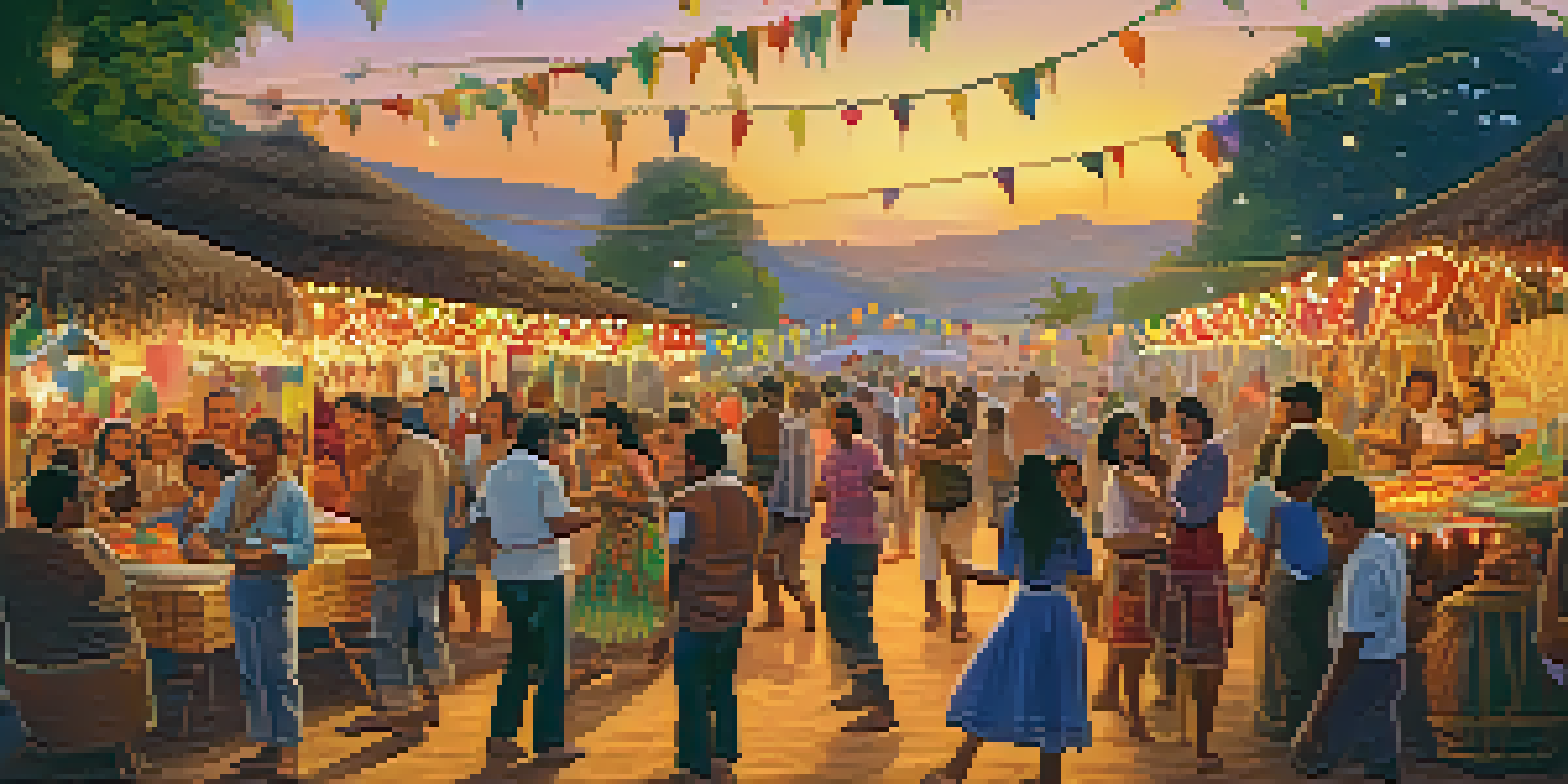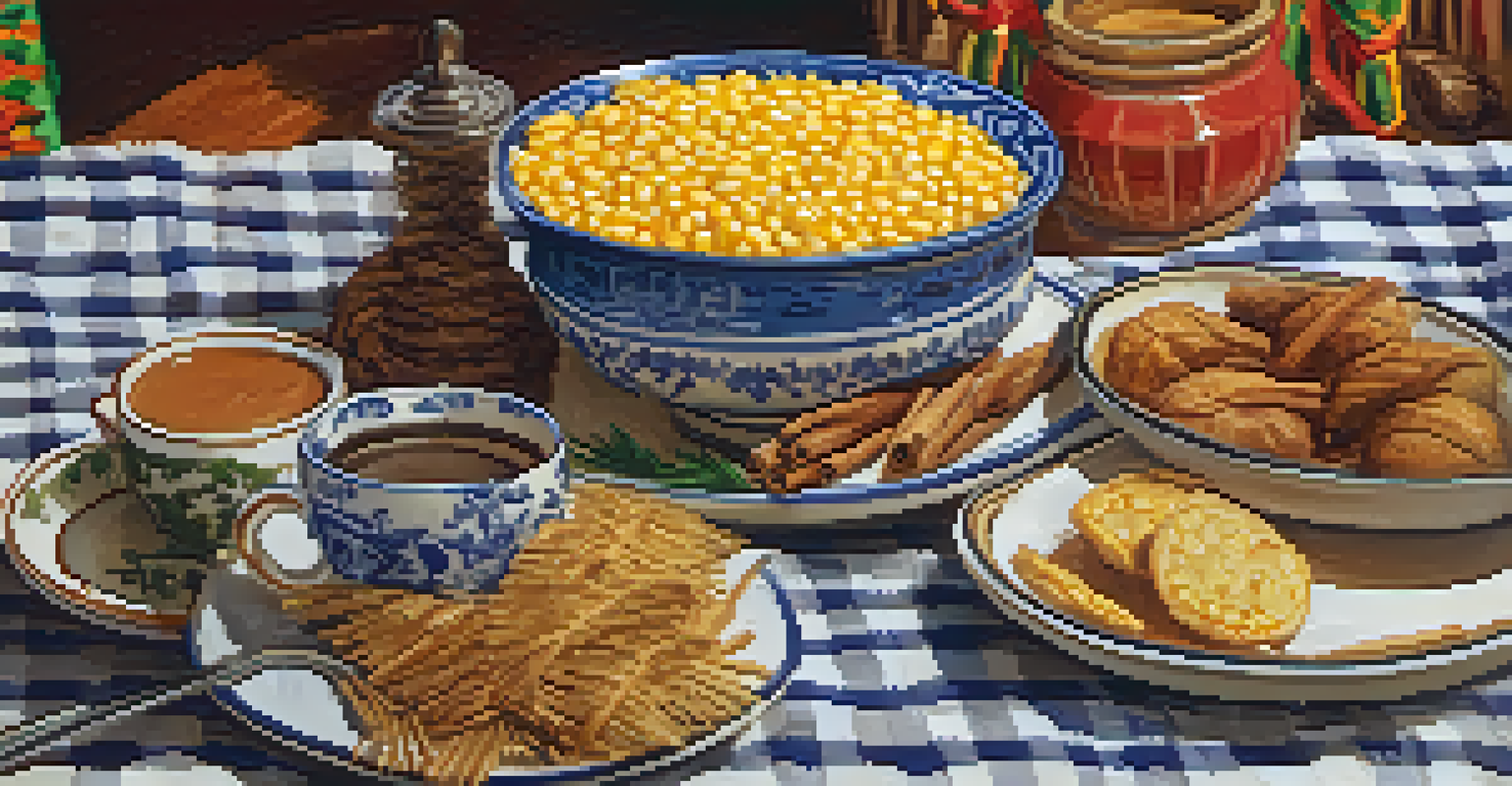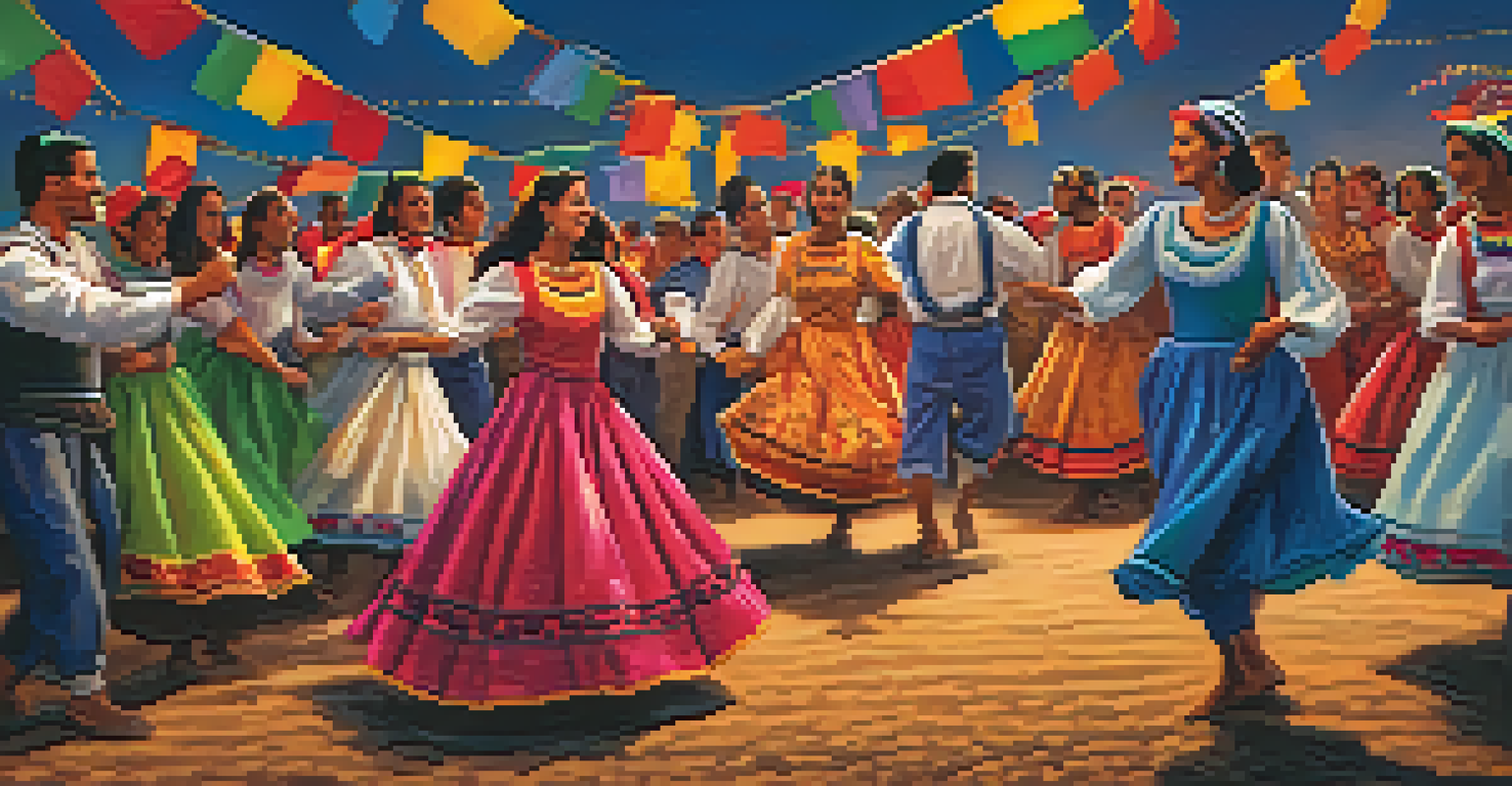The Cultural Significance of the Festa Junina in Brazil

Festa Junina: A Celebration of Brazilian Culture
Festa Junina is a vibrant festival celebrated across Brazil, occurring in June. It honors the rural traditions and the agricultural lifestyle that is so deeply rooted in Brazilian culture. This festival is not just a date on the calendar; it represents a beautiful blend of history, music, and community spirit.
Tradition is not the worship of ashes, but the preservation of fire.
The celebration's origins trace back to European harvest festivals, but it has evolved uniquely in Brazil, incorporating elements from Indigenous and African cultures. The result is a rich tapestry of colors, sounds, and flavors that come together to create a truly Brazilian experience.
From lively quadrilha dances to the delicious array of traditional foods, Festa Junina is a time for families and friends to gather and celebrate. It serves as a reminder of the importance of community and the joy of shared traditions.
Traditional Foods That Define the Festival
One of the most delightful aspects of Festa Junina is its food. Festivities are filled with mouth-watering treats like pamonha (corn pudding), canjica (sweet corn porridge), and quentão (a warm spiced drink). These dishes not only tantalize the taste buds but also tell the story of the agricultural bounty of Brazil.

Food stalls and communal feasts are central to the celebration, creating an atmosphere of sharing and togetherness. Families often come together to prepare these traditional foods, passing down recipes through generations. This culinary tradition reinforces the bonds of family and community.
Festa Junina Celebrates Community
This vibrant festival fosters strong social ties and unity among diverse community members through shared traditions and activities.
Moreover, the flavors of Festa Junina are intertwined with the seasonality of local ingredients, showcasing Brazil's diverse agricultural landscape. Each bite is a taste of local culture, making the festival not just a feast for the stomach but also for the soul.
The Role of Music and Dance in the Celebration
Music and dance are at the heart of Festa Junina, infusing the festival with energy and joy. Traditional songs like 'Olha Pro Céu' and 'Asa Branca' invite everyone to join in the celebration. The lively rhythms encourage people to dance the quadrilha, a folk dance that brings everyone together in a fun and interactive way.
Food is our common ground, a universal experience.
The quadrilha is more than just a dance; it’s a playful performance that often features costumes and storytelling elements. Participants dress in traditional rural attire, which adds to the festive atmosphere and honors the cultural heritage of Brazil. This performance aspect enhances community interaction and fosters a sense of belonging.
In essence, music and dance serve as expressions of identity and continuity, allowing people to connect with their roots while creating lasting memories. They ensure that the spirit of Festa Junina lives on in the hearts of those who celebrate it.
The Importance of Community in Festa Junina
At its core, Festa Junina is a community affair. Neighbors come together to organize events, share resources, and celebrate their shared heritage. This collaborative spirit fosters strong social ties and reinforces the sense of belonging among community members.
The festival also provides opportunities for families to bond, as they participate in various activities together. From decorating the venue to preparing traditional dishes, every task becomes a cherished memory. Such shared experiences are vital in nurturing relationships and creating a supportive community atmosphere.
Traditional Foods Enrich the Festival
The culinary delights of Festa Junina, such as pamonha and canjica, reflect Brazil's agricultural bounty and strengthen family bonds through communal feasting.
Moreover, Festa Junina serves as a reminder of the importance of unity in diversity. People from various backgrounds come together to celebrate, showcasing the beauty of Brazil's multicultural society. This festival is a testament to the strength found in community connections.
Religious Aspects of the Festival
Festa Junina has deep religious roots, originally linked to the feast days of saints, particularly St. John, St. Anthony, and St. Peter. Many festivities include rituals and prayers that honor these patron saints, reflecting the spiritual aspect of the celebration. These elements highlight the intertwining of faith and culture in Brazilian society.
The festival often features religious processions, where participants carry images of the saints through the streets. Such activities create a sense of reverence and connection to the divine, reminding attendees of the festival's spiritual significance amidst the joyous celebrations.
By incorporating these religious elements, Festa Junina becomes not only a celebration of culture but also an opportunity for reflection and gratitude. It serves as a reminder of the values that bind the community together and the faith that inspires them.
Festa Junina: A Time for Family Gatherings
Festa Junina is synonymous with family gatherings, as it is a time when relatives come together to celebrate. Families often travel from far and wide to participate in the festivities, reinforcing the bonds that may have weakened over time. It’s a wonderful reminder of the importance of family ties.
During the festival, families engage in various activities, from cooking traditional dishes to participating in games and dances. These shared experiences create lasting memories and foster a sense of unity. It’s not just about the festival itself, but about the connections that are strengthened during this time.
Music and Dance Connect Generations
The lively music and dance, particularly the quadrilha, serve as a joyful expression of cultural identity and continuity during the festival.
Ultimately, Festa Junina serves as a reminder to appreciate family connections and the importance of spending quality time with loved ones. It encapsulates the essence of community and family, making it a cherished tradition for many Brazilians.
The Modern Evolution of Festa Junina
While Festa Junina is steeped in tradition, it has also evolved to reflect contemporary society. Modern interpretations of the festival often incorporate new music styles and innovative food options, appealing to younger generations. This evolution keeps the celebration fresh and relevant while honoring its roots.
Social media has played a significant role in this evolution, as families and communities share their experiences and festivities online. This not only helps preserve the traditions but also spreads awareness about the festival to a global audience. The festival's visibility has grown, attracting tourists and fostering cross-cultural interactions.

As Festa Junina continues to evolve, it remains a powerful symbol of Brazilian identity and cultural pride. This adaptability ensures that while the core values and traditions remain, the festival can continue to resonate with new generations.